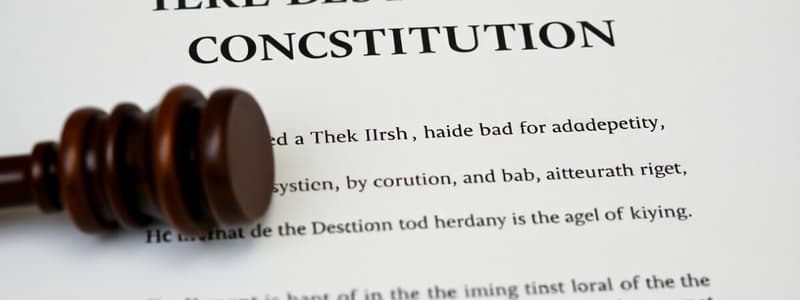Podcast
Questions and Answers
What does Article 41.3 of the Irish Constitution imply about marriage?
What does Article 41.3 of the Irish Constitution imply about marriage?
- It restricts marriage to certain demographics.
- It prohibits marriage to protect personal rights.
- It allows civil unions only.
- It guarantees a constitutional right to marry. (correct)
What are the key influences of the 1937 Constitution?
What are the key influences of the 1937 Constitution?
- British Law and the Irish Language
- Economic Policies and National Sovereignty
- Irish Language and Fundamental Rights (correct)
- International Treaties and Political Parties
What is meant by 'unenumerated rights' within the Irish Constitution?
What is meant by 'unenumerated rights' within the Irish Constitution?
- Rights that cannot be identified by judges.
- Rights not specifically listed but interpreted by judges. (correct)
- Rights that are revoked by amendments.
- Rights that are explicitly listed in the Constitution.
What must all legislation and judicial decisions be in accordance with?
What must all legislation and judicial decisions be in accordance with?
How can amendments to the Irish Constitution be made?
How can amendments to the Irish Constitution be made?
What is typically considered the supreme source of law in Ireland?
What is typically considered the supreme source of law in Ireland?
Which fundamental right is guaranteed by Article 43.1 of the Irish Constitution?
Which fundamental right is guaranteed by Article 43.1 of the Irish Constitution?
Under what conditions can fundamental rights in the Irish Constitution be limited?
Under what conditions can fundamental rights in the Irish Constitution be limited?
What does the term 'unenumerated rights' refer to in the context of the Irish Constitution?
What does the term 'unenumerated rights' refer to in the context of the Irish Constitution?
Which article of the Irish Constitution guarantees the right to marry someone irrespective of their sex?
Which article of the Irish Constitution guarantees the right to marry someone irrespective of their sex?
What is the purpose of a Commencement Order?
What is the purpose of a Commencement Order?
Which approach to statutory interpretation focuses on the ordinary meaning of words?
Which approach to statutory interpretation focuses on the ordinary meaning of words?
In which case was the Golden Rule applied to avoid an unjust result?
In which case was the Golden Rule applied to avoid an unjust result?
What does the principle of 'ultra vires' pertain to in the context of delegated legislation?
What does the principle of 'ultra vires' pertain to in the context of delegated legislation?
Which method of statutory interpretation combines aspects of both the Golden and Mischief Rules?
Which method of statutory interpretation combines aspects of both the Golden and Mischief Rules?
What is the main role of the Dáil within the Oireachtas?
What is the main role of the Dáil within the Oireachtas?
What are the two houses that comprise the Oireachtas?
What are the two houses that comprise the Oireachtas?
Which of the following is NOT a function of the President under the Constitution?
Which of the following is NOT a function of the President under the Constitution?
What is the initial stage in the legislative process for a Bill?
What is the initial stage in the legislative process for a Bill?
What is a key characteristic of the Seanad Éireann?
What is a key characteristic of the Seanad Éireann?
What term describes law made by Government Departments or other delegated bodies?
What term describes law made by Government Departments or other delegated bodies?
Which of the following actions can a Bill undergo during the Third Stage in the legislative process?
Which of the following actions can a Bill undergo during the Third Stage in the legislative process?
What is the primary source of power to make legislation in Ireland?
What is the primary source of power to make legislation in Ireland?
What is the primary aim of EU Regulations?
What is the primary aim of EU Regulations?
Which of the following characteristics is true for EU Directives?
Which of the following characteristics is true for EU Directives?
What distinguishes EU Decisions from other forms of legislation?
What distinguishes EU Decisions from other forms of legislation?
Which of the following statements about EU Recommendations and Opinions is correct?
Which of the following statements about EU Recommendations and Opinions is correct?
What is a key difference between EU Regulations and EU Directives?
What is a key difference between EU Regulations and EU Directives?
What does the Doctrine of Precedent primarily emphasize in judicial decision-making?
What does the Doctrine of Precedent primarily emphasize in judicial decision-making?
Which principle allows a court to decide that a case is sufficiently different from a previously decided case?
Which principle allows a court to decide that a case is sufficiently different from a previously decided case?
What is the primary law of the European Union composed of?
What is the primary law of the European Union composed of?
Which of the following is NOT an extrinsic aid in statutory interpretation?
Which of the following is NOT an extrinsic aid in statutory interpretation?
What does the presumption of constitutionality imply?
What does the presumption of constitutionality imply?
Under what condition can higher courts overrule decisions made by lower courts?
Under what condition can higher courts overrule decisions made by lower courts?
What is the primary characteristic of EU Regulations?
What is the primary characteristic of EU Regulations?
What role does the Ratio Decidendi play in judicial precedent?
What role does the Ratio Decidendi play in judicial precedent?
Flashcards
Irish Constitution
Irish Constitution
Supreme source of law in Ireland, establishing how the country is governed and ensuring fundamental rights.
Fundamental Rights
Fundamental Rights
Basic rights guaranteed by the Irish Constitution, though not absolute; they can be limited by public interest.
Unenumerated Rights
Unenumerated Rights
Fundamental rights not explicitly listed in the Irish Constitution, but inferred through judicial interpretation.
Constitutional Rights Examples
Constitutional Rights Examples
Signup and view all the flashcards
Limited Fundamental Rights
Limited Fundamental Rights
Signup and view all the flashcards
Irish Constitution
Irish Constitution
Signup and view all the flashcards
Fundamental Rights
Fundamental Rights
Signup and view all the flashcards
Enumerated Rights
Enumerated Rights
Signup and view all the flashcards
Unenumerated Rights
Unenumerated Rights
Signup and view all the flashcards
Constitutional challenge
Constitutional challenge
Signup and view all the flashcards
Constitutional Convention
Constitutional Convention
Signup and view all the flashcards
Amendments to the Constitution of Ireland
Amendments to the Constitution of Ireland
Signup and view all the flashcards
Citizens' Assembly
Citizens' Assembly
Signup and view all the flashcards
Oireachtas
Oireachtas
Signup and view all the flashcards
Primary Legislation
Primary Legislation
Signup and view all the flashcards
Dáil Éireann
Dáil Éireann
Signup and view all the flashcards
Seanad Éireann
Seanad Éireann
Signup and view all the flashcards
Delegated Legislation
Delegated Legislation
Signup and view all the flashcards
Delegated Legislation
Delegated Legislation
Signup and view all the flashcards
Statutory Interpretation
Statutory Interpretation
Signup and view all the flashcards
Literal Rule (Statutory Interpretation)
Literal Rule (Statutory Interpretation)
Signup and view all the flashcards
Mischief Rule (Statutory Interpretation)
Mischief Rule (Statutory Interpretation)
Signup and view all the flashcards
Ultra Vires
Ultra Vires
Signup and view all the flashcards
EU Regulation
EU Regulation
Signup and view all the flashcards
EU Directive
EU Directive
Signup and view all the flashcards
EU Decision
EU Decision
Signup and view all the flashcards
Secondary EU Law
Secondary EU Law
Signup and view all the flashcards
Statutory Interpretation
Statutory Interpretation
Signup and view all the flashcards
Presumption of Constitutionality
Presumption of Constitutionality
Signup and view all the flashcards
Ejusdem Generis
Ejusdem Generis
Signup and view all the flashcards
Judicial Precedent
Judicial Precedent
Signup and view all the flashcards
Ratio Decidendi
Ratio Decidendi
Signup and view all the flashcards
Hierarchy of Courts
Hierarchy of Courts
Signup and view all the flashcards
European Union Law
European Union Law
Signup and view all the flashcards
Regulations (EU law)
Regulations (EU law)
Signup and view all the flashcards
Presumption against retrospective effect
Presumption against retrospective effect
Signup and view all the flashcards
Study Notes
Irish Legal System - Sources of Law
- Ireland's legal system has four major primary sources: European Union Law, Bunreacht na hÉireann (Irish Constitution), Legislation, and Case Law/Common Law.
- The Bunreacht na hÉireann is the supreme and highest-ranking domestic source of law, outlining the country's governance and fundamental rights.
- Examples of fundamental rights include the right to marry (regardless of sex), free primary education, and owning private property. Freedom of conscience and religion are also guaranteed, with some limitations in special cases.
- However, fundamental rights are not absolute and can be limited for the common good or public order (e.g., freedom of movement can be restricted in some circumstances). Personal liberty, inviolability of home (with warrant exceptions), and property rights are examples of rights subject to limitations.
- Unenumerated rights, those not explicitly listed in the Constitution, are also recognized through interpretation of its text. Examples include the right to marry, bodily integrity, and earning a livelihood.
- The Irish Constitution consists of the 1922 Constitution, the Free State Constitution, and the 1937 Constitution currently in effect. The document utilizes 50 articles organized into sections and sub-sections. It's available online.
- The Constitution also delineates the structure of the Irish legislature (the Oireachtas, comprising Dáil Éireann, Seanad Éireann, and the President).
- Articles 2 and 3 specify the national territory, and the Oireachtas' composition (articles 15-27).
- Articles 40-44 detail fundamental enumerated rights.
- Ryan v Attorney General (1965) case affirmed the existence of unenumerated rights not listed in the constitution.
- Legislation made by the Oireachtas must adhere to the Constitution, and individuals can challenge laws that conflict with constitutional provisions.
- An amendment process exists for the constitution, requiring a referendum.
Sources of Law - Legislation
- Legislation, also known as Acts or Statutes, are legal documents created by the Oireachtas.
- The Oireachtas is composed of the Dáil Éireann, Seanad Éireann, and the President.
- The power to make legislation is delegated to the Oireachtas by Article 15.2.1 of the Constitution.
- The legislative process involves several stages: initiation, general principles debate, committee scrutiny of the bill's sections and amendments, and culminating in the bill's passage through both legislative houses and the President's signing into law. This final stage is called enactment.
- The role of the President includes the consideration of bills passed by the legislature, with associated references to the Supreme Court as outlined in Article 26 of the Constitution. Article 27 outlines additional legislative processes.
- Bills can be categorized into government bills, private member bills, public bills (public interest focus), and money bills (financial matters).
- Resources for accessing current bills are available on the Oireachtas website.
Sources of Law - Delegated Legislation
- Delegated legislation (also known as secondary legislation) is created by government departments or other delegated bodies, authorized by acts of the Oireachtas.
- This legislation is largely framed as statutory instruments, orders, regulations, schemes, or rules, with a formal structure and purpose.
- Examples include commencement orders, which give force of law to an act or statute. Local authorities create bye laws.
Sources of Law - Judicial Precedent
- Ireland's common law system is heavily reliant on judicial precedent (the doctrine of stare decisis).
- Similar cases are resolved based on the reasoning previously applied in those cases.
- The Ratio Decidendi (reasoning for the decision) is binding in future cases.
- Decisions from higher courts hold more weight than from lower courts. Higher courts have the power to overrule decisions made by lower courts.
- Decisions from other jurisdictions, and dissenting judgments are persuasive, but not binding, and considered supplemental.
- Locating and understanding a relevant case is critical, through proper citations.
Sources of Law - Statutory Interpretation
- Legislation is interpreted by judges, with a range of approaches, although the ability to alter statutes is prohibited (due to separation of powers).
- Examples of statutory interpretation methodologies include the literal rule, golden rule (avoiding absurd interpretations), and mischief rule (identifying the legislative intent to address a specific problem). Purposive or schematic or teleological analysis combines the other two.
- Important cases like Whitely v Chappell and Re Sigsworth and Smith v Hughes illustrate how judges apply these rules in real situations.
Sources of Law - European Union Law
- EU law significantly influences Ireland's legal system.
- Ireland joined the EU in 1973.
- Primary EU law includes treaties.
- Secondary EU law takes the form of regulations (binding and directly applicable to all Member States), directives (binding the Member States in result, but allowing flexibility in implementation), and decisions (binding to directly addressed individuals or member states).
- Both EU regulations and directives are explained in detail, highlighting differences in their application and implementation within the European Union.
Additional Reading
- Refer to Áine Keenan (chapters 1 & 29), Kennelly & Tully (chapters 5-8), and Byrne & McCutcheon (chapters 2, 12 - 16) for in-depth examination of the topics.
Studying That Suits You
Use AI to generate personalized quizzes and flashcards to suit your learning preferences.



